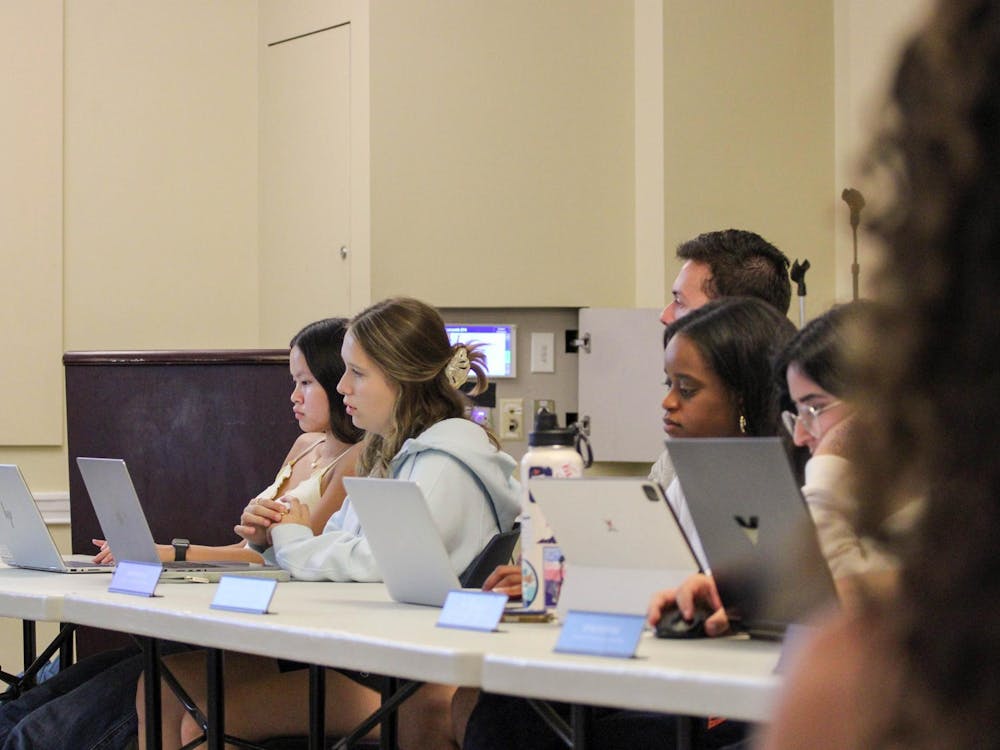Clemons Library became an all-night haven for late-night study efforts of University students, faculty and staff on Monday, Oct. 30. But before the program is fully established, library administrators want to make sure benefits to students outweigh costs to the University.
Clemons currently is open all night from Sunday through Thursday, and until midnight on Friday and Saturday.
So far during the pilot period, which is scheduled to run through final exams this spring, the number of students using the facilities increases each week, said Director of Clemons Library Vicki Coleman.
"We are excited about the program - the numbers are high," she said.
Coleman said that during the first week, 524 people were in the library during the new extended hours, 565 people were there during the program's second week and 625 people were there during the third week.
|
"We have gotten nothing but positive feedback" about the program from students, Coleman said. "People are saying they are so glad we are having this program."
Even with the positive feedback, Coleman said the University is assessing the merits of the program - including its price tag.
She said the cost of keeping the library open at night - excluding startup and security costs - for 24 hours, 5 nights a week is $45 per hour for each hour between 2 a.m. and 8 a.m. That number includes staff salaries and benefits that are provided for within the University's budget, Coleman said.
At 2:30 a.m. on Monday morning after the Thanksgiving holiday, nighttime employees counted 19 people on the floor and 10 in the lab, which Overnight Supervisor Ana Thea Alexa said was the smallest number of people that have been there since the program started.
"On average, between 2 a.m. and 8 a.m. there are a little over 100 people within the library or passing through," Coleman said.
Coleman said on average, 105 people were in the library per night during the first week of the program, 113 people in the second week and in the third week 125 people during the extra hours.
She added that the average number of people in the library during the extra hours for the month the program has been in operation is about 119 people per night.
She also said that during the month the program has been in effect, the average number of people entering the library each hour during the extra hours is about 5. The people who are in the library at 2 a.m. tend to stay there through the night.
Nighttime employees Alexa and Overnight Building Monitor Darby Morrisroe are charged with monitoring the comings and goings in late-night Clemons.
Alexa said that she and Morrisroe are temporary, salaried employees. Coleman said they are not paid more than employees who work during regular hours.
Coleman said half the funding for the extra Clemons hours comes from the University's central operating budget and the other half comes from President Casteen's discretionary fund.
Coleman said the library is going to work with Student Council to evaluate the first couple of weeks and establish some standards, such as how many students need to use the library during the extra hours to make it worthwhile.
Council President Joe Bilby said he is optimistic that Council will be able to work well with library staff during the meeting.
In addition to their jobs as librarians, the nighttime employees have the extra responsibility of ensuring the security of the students in the library.
University Police Capt. Michael Coleman said there have been few problems with safety in Clemons during the late night hours. So far, one student reported lost property and one non-University person was escorted out of the library for trespassing.
During the night, Morrisroe checks IDs at the door, said Vicki Coleman.
She said the library is considering installing an automated card swiper in the future.
But Alexa said the library is concerned with the possibility that students could give their ID cards to non-University friends. To deal with that problem, Alexa said the library is also considering installing security cameras.
Vicki Coleman said the library has a one-time fund of $15,000 to install security equipment and now is trying to decide what type of equipment to purchase.
"A card swiper on the exterior of the library door would cost $6,000. It has to be wired and have sensors," she said. "The price of a security camera will vary depending on how many we buy" and that could cost over $9,000. Clemons is considering the cost of installing cameras on every floor, Vicki Coleman said.
She said card swipers might be cheaper than cameras, but they would not offer the security of the cameras in places like the stairs outside the library to "make sure no one is lurking there."
The night librarians have other additional responsibilities besides monitoring for security.
In preparation for the extra hours, Alexa and Morrisroe make three announcements that they are going to lock the other floors and the elevator, and that students cannot check out materials until 8 a.m.
Every hour on the half-hour, starting at 2:30 a.m., Alexa and Morrisroe count how many people are on the floor and how many are using the computers in the lab in the back of the floor.
Morrisroe also restarts all the computers on the floor halfway through the night, Alexa said.
Alexa monitors the front desk and answers student questions, checks in returned laptops and answers the phone.
She said that although students cannot check out materials after 2 a.m., laptops that were checked out before 2 a.m. can be renewed so that students can keep using them until 8 a.m. Students also can return materials at any time, Vicki Coleman said.
She said the nighttime employees talk with the morning employees, and they are in e-mail contact with the other employees through the night to report their statistics and evaluation of their shift.
Alexa said she does not mind the extra duties as an overnight librarian because she feels that such a program at Clemons is important.
She wants to promote a quiet environment for students who are "on edge because of a deadline," making sure others do not talk loudly and distract them. She said students can talk quietly in groups, but not noisily, since people are trying to complete work quickly.
"We want it to be quiet, not like the social daytime fourth floor of Clemons," she said.
Alexa said she likes working during the extra hours because she "enjoys talking with students of this age group" and she wants a safe place for students to study at night.
She worked the Clemons graveyard shift during finals in past years because "this program is a passion for me," she said, adding that she was surprised that the University did not have libraries open all night.
Alexa said a campus security officer makes a visit once a night. She also said she does not mind if students take a short nap to "rejuvenate."
The results of the program so far are encouraging library administrators to consider possible future expansion of the program.
"We are looking into opening another floor," Vicki Coleman said. She said library administrators will make that decision next semester. Right now they are considering opening the other floors, which remain open during final exam periods.
"We are working on whether people can use the computers and labs on the third floor. We would need a different kind of staff who would know how to use that equipment, and that would cost more," Coleman said.
The large numbers of people restricted to the fourth floor has sometimes led to excessive noise - one reason that Clemons is considering opening the other floors, she said.
Coleman said the library would consider staying open all night seven days a week, but right now the crowd tapers off by Thursday night.
Most of the people who use Clemons during the night are students, and occasionally faculty members come shortly before 8 a.m.
Coleman said the University of Michigan, University of Southern California and the University of Texas-Austin have similar programs.






